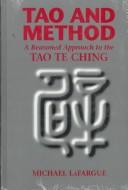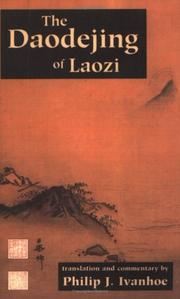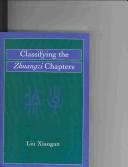| Listing 1 - 10 of 37 | << page >> |
Sort by
|
Book
ISBN: 2702903630 Year: 1998 Publisher: Paris : Le Courrier du Livre,
Abstract | Keywords | Export | Availability | Bookmark
 Loading...
Loading...Choose an application
- Reference Manager
- EndNote
- RefWorks (Direct export to RefWorks)
Ce livre est un événement dans le monde de l'édition française.A la fin des années soixante, résidant et enseignant à New-York, le fameux maître de Taiji Quan et grand érudit Cheng Man Ch'ing donna un cycle de conférences pour ses élèves où il commentait les 81 chapitres du chef-d'oeuvre de la littérature chinoise classique, le TAO TE KING. Les commentaires du maître Cheng Man Ch'ing nous font apparaître le Tao Te King sous un jour nouveau qui étonnera bien des lecteurs, admirateurs de la pensée du "vieux maître".L'édition française reprend le texte chinois du Tao Te King, sa traduction et le commentaire de Cheng Man Ch'ing, avec une préface de maître Tong.
Book
ISBN: 9787508522005 7508522001 Year: 2012 Publisher: Beijing : China Intercontinental Press : Zhonghua Book Company,
Abstract | Keywords | Export | Availability | Bookmark
 Loading...
Loading...Choose an application
- Reference Manager
- EndNote
- RefWorks (Direct export to RefWorks)
Book
Year: 1957 Publisher: London : Methuen,
Abstract | Keywords | Export | Availability | Bookmark
Book
ISBN: 9781438458984 9781438458984 9781438458991 9781438458977 1438458975 Year: 2015 Publisher: Albany : ©2015 State University of New York Press,
Abstract | Keywords | Export | Availability | Bookmark
 Loading...
Loading...Choose an application
- Reference Manager
- EndNote
- RefWorks (Direct export to RefWorks)
Thomas Michael's study of the early history of the Daodejing reveals that the work is grounded in a unique tradition of early Daoism, one unrelated to other early Chinese schools of thought and practice. The text is associated with a tradition of hermits committed to yangsheng, a particular practice of physical cultivation involving techniques of breath circulation in combination with specific bodily movements leading to a physical union with the Dao. Michael explores the ways in which the text systematically anchored these techniques to a Dao-centered worldview. Including a new translation of the Daodejing, In the Shadows of the Dao opens new approaches to understanding the early history of one of the world's great religious texts and great religious traditions.
Laozi. --- Confucius. --- Dao de jing (Laozi) --- Lun yu (Confucius)
Book
ISBN: 9782908606614 2908606615 Year: 2010 Publisher: Paris Entrelacs
Abstract | Keywords | Export | Availability | Bookmark
 Loading...
Loading...Choose an application
- Reference Manager
- EndNote
- RefWorks (Direct export to RefWorks)
Lao-tseu (ou Laozi), le Vieux Maître, est une grande figure de la pensée chinoise, un sage dont l'historicité s'efface derrière la légende. Mais il est aussi un personnage important du taoïsme, divinisé sous le titre de Très Haut Seigneur Lao et qui, bien que représenté sous forme humaine, procède en réalité du chaos primordial, se confond avec l'origine des choses et manifeste de temps à autre des signes pour guider le monde. Au cours des siècles, sa pensée a exercé une influence considérable dans toutes les couches de la société chinoise et dans des milieux très divers : gens des campagnes, artisans et commerçants, ermites, lettrés, militaires, religieux, artistes, médecins, empereurs, impératrices et. plus récemment, spécialistes d'arts martiaux et maîtres de qi gong. Ses adages servent à la connaissance de soi, mais aussi dans l'art de la guerre, l'exercice de l'autorité, l'art de rester en bonne santé et la recherche du bien-être. Guide de l'insondable, Lao-tseu montre le chemin vers l'ineffable Voie et apprend à palper la respiration du monde. Il propose une philosophie de l'agir sans interférer dans le cours des choses, un cheminement vers la connaissance de soi pour oeuvrer dans le monde. Le sage protège son souffle, conserve sa puissance spirituelle et maintient l'intégrité de son être, afin que la sagesse qui en découle lui permette de trouver la Voie mais aussi de servir autrui.
Book
ISBN: 9787305066078 7305066078 Year: 2010 Publisher: Nanjing city Nanjing university press
Abstract | Keywords | Export | Availability | Bookmark
 Loading...
Loading...Choose an application
- Reference Manager
- EndNote
- RefWorks (Direct export to RefWorks)
Taoist philosophy. --- Philosophy, Chinese --- Laozi. --- Taoists

ISBN: 0791416011 9780791416020 Year: 1994 Publisher: Albany State university of New York press
Abstract | Keywords | Export | Availability | Bookmark
 Loading...
Loading...Choose an application
- Reference Manager
- EndNote
- RefWorks (Direct export to RefWorks)
Philosophy, Chinese --- Laozi. --- China --- Intellectual life

ISBN: 0872207013 0872207021 9780872207011 9780872207028 Year: 2002 Publisher: Indianapolis, Ind. Hackett
Abstract | Keywords | Export | Availability | Bookmark
 Loading...
Loading...Choose an application
- Reference Manager
- EndNote
- RefWorks (Direct export to RefWorks)
Philip J. Ivanhoe's richly annotated translation of this classic work is accompanied by his engaging interpretation and commentary, a lucid introduction, and a Language Appendix that compares eight classic translations of the opening passage of the work and invites the reader to consider the principles upon which each was rendered.
S12/0500 --- China: Philosophy and Classics--Laozi and Taoism (incl. Daodejing) --- Philosophy --- Chinese literature --- Laozi.
Book
ISBN: 2020002892 Year: 1982 Volume: 34 Publisher: Paris Seuil
Abstract | Keywords | Export | Availability | Bookmark
 Loading...
Loading...Choose an application
- Reference Manager
- EndNote
- RefWorks (Direct export to RefWorks)
Taoism --- Taoïsme --- Laozi --- #GROL:SEMI-1<513>

ISBN: 0892641061 047212739X 0472901346 9780472127399 9780472901340 0892641649 Year: 1994 Publisher: Ann Arbor Center for Chinese Studies. The University of Michigan
Abstract | Keywords | Export | Availability | Bookmark
 Loading...
Loading...Choose an application
- Reference Manager
- EndNote
- RefWorks (Direct export to RefWorks)
The relationships, both historical and philosophical, among the Zhuangzi’s Inner, Outer, and Miscellaneous chapters are the subject of ancient and enduring controversy. Liu marshals linguistic, intertextual, intratextual, and historical evidence to establish an objectively demonstrable chronology and determine the philosophical affiliations among the various chapters. This major advance in Zhuangzi scholarship furnishes indispensable data for all students of the great Daoist text. In a lengthy afterword, Liu compares his conclusions with those of A. C. Graham and addresses the relationship between the Zhuangzi and the Laozi.
S12/0600 --- China: Philosophy and Classics--Zhuangzi --- Laozi. --- Zhuangzi. --- 莊子. --- Chuang-tzu. --- Lao-tzu. --- 老子. --- Zhuangzi. Nanhua jing. --- Laozi. Dao de jing.
| Listing 1 - 10 of 37 | << page >> |
Sort by
|

 Search
Search Feedback
Feedback About UniCat
About UniCat  Help
Help News
News